
Open competition for design and research work of schoolchildren "Sails of Science"
Research work
on the topic:
“The influence of Anglicisms on the Russian language”
Work completed:
Ivanova Anna Sergeevna,
11th grade student
Phone :( 961) -809-43-09
State budgetary educational institution
School No. 93 of the Pushkin District of St. Petersburg
(shushari93school@gmail.com)
Scientific adviser:
Zaitsev Stanislav Yurievich
Phone: 8 (900) 637-59-54
St. Petersburg
Pushkin
February 2020
Table of contents
Introduction…………………………………………………………………..………………...3
Chapter 1 The study of the phenomenon of borrowing, public opinion about it and existing data and scientific papers.
1.1 Definition of the word "borrowing" .....................................................................................5
1.2 Historical background …………………………………………………………………......5
1.3 English Language Explorer ..................................................................................................6
1.4 Typification of borrowing …………………………………………..…………………......7
1.5 Signs …………………………………………………………………….............................8
1.6 Areas of application of Anglicisms ......................................................................................8
1.7 Reasons and conditions for borrowing ...............................................................................10
1.8 Structure of the process ......................................................................................................11
Degree of adaptation ………………………………………………..………………….…….12
1.10 Public Attitude to the Borrowing Phenomenon ……………………………………..….12
Chapter 2 Survey and media analysis
2.1 Analysis of local media ………………………………………………………………..…13
2.2 Questioning and analysis of its results …………………………………………..……….14
Chapter 3
3.1 Justification of the choice of methods for solving problems ….…………………………15
3.2 Project implementation…...………………………………………………………………16
Conclusion ………………………………………………………………………………… ..16
List of references……………………………………………………………...………………18
Internet resources……………………………………………………………...……………...18
Appendices ……………………………………………………………………..… ... ………19
Introduction
The relevance of this topic is associated with the increased penetration of foreign terms into the Russian language, which led to an intensified polemic among linguists and representatives of the Russian public who spoke about the need of the language to cleanse other people's words and protect against invasive borrowing intrusion.
Thus, the State Duma proposed at the legislative level to limit the use of foreign words in the presence of their Russian synonyms. This initiative is present, for example, in one of the provisions of the "Law on Russian as the State Language in the Russian Federation" prepared by the State Duma.
Of course, it is necessary to select the original analogues of borrowings, most of all in the environment of the public use of the Russian language: often the native word conveys the desired meaning rather than the foreign one. Obvious, for example, is the synonymity of the word “exclusive” and the Russian adjective “exceptional”. Therefore, it is necessary to eradicate it from circulation as garbage? Not everything is so obvious.
For example, the previously laughed word "water cannon" perfectly duplicates the essence of the Latin "fountain". And what is the rather eloquent and transparent “eye” in the device worse than the term of the Greek roots “horizon”? Nevertheless, Russian speech was pleased to preserve the new words, not the original ones. Nevertheless, the selection of Russian correspondences to foreign ones is an important task. But is it only necessary to turn this research into a mandatory rule?
The phenomenon of borrowing was devoted to the works of such Russian and foreign linguists as: JI.V. Shcherby, A.A. Potebni, A.A. Reformed, V.V. Vinogradova, Yu.S. Sorokina, O.S. Akhmanova, L.P. Rat, E.E. Birzhakova, K.V. Gorshkova, N.M. Shansky, N.S. Avilova, P.Ya. Chernykh, A.V. Kalinina, M.I. Fomina, E.V. Kuznetsova, E.I. Zemsky, I.G. Milo-Slavsky, M.V. Popova, D.N. Shmelev, V.G. Kostomarov, V.V. Kolesov, N.S. Valgina, I.A. Sternina, I.I. Ogienko, Ferdinand de Saussure, E. Hau-gene, Max Fasmer, Rudia Conrad and others.
“There is not a single language on earth in which the vocabulary is limited only to its original words. In every language there are also borrowed words, foreign words. In different languages and at different periods of their development, the percentage of these “not their” words is different, ”A.A. Reformed in his book "Introduction to Linguistics" (Reformed 2004, p. 139).
Due to the development of the computer, technical, financial and economic sectors, a large number of Englishisms have penetrated into the Russian language. In the dictionary S.I.
Ozhegova there is the following interpretation of the word "Anglicism": "Anglicism is a word or speech in any language; borrowed from the English language or created on the model of the English language or expression. ”Anglicisms are an interesting linguistic phenomenon that plays a very significant role in the Russian language, which this work is devoted to.
Before the creation of the work, I suggested that the appearance of Anglicisms in modern speech is connected with the state of Russia's economic, political and cultural relations with other countries and, despite the negative attitude of some scientists and public figures towards them, are an integral part of the development of the language.
The purpose of the study: to study English borrowings from the point of view of the linguistic phenomenon, to reduce the number of inappropriately used borrowings in the speech of the population by creating a public electronic dictionary.
Research Objectives:
1. To deduce typical signs of Anglicisms for their identification in Russian;
2. To determine the areas of public life of the greatest use of Anglicisms;
3. To formulate the grounds for the excessive volume of Englishisms in the Russian language;
4. Get acquainted with the classification of Anglicisms;
5. To consider slang from the point of view of the conductor of English borr
owings in the native language;
6. To analyze the positive and negative aspects of the influence of Anglicisms.
7. To study the speeches of students and teachers GBOU school number 93, as well as articles in local media on the use of foreign vocabulary
8. Create a public page on social networks intended for electronic dictionary
To perform the tasks indicated in the work
I had used methods:
· Conversation
· Study of scientific literature and archival data
· Analysis of statistics
· Questioning
· Classification and systematization of information received
· Hypothesis Method
Chapter 1. The study of the phenomenon of borrowing, public opinion about it and existing data and scientific papers.
1.1 Definition of word "borrowing"
Study of the effect of borrowing - the study of a combination of linguistic and non-linguistic problems, including issues affecting variations in the interpretation of a given word, types of borrowings, conditions and reasons for borrowing, transformation of borrowings in the recipient language, etc. The term "borrowing" in linguistics is ambiguous. Many scholars distinguish between the concepts of “borrowing” and “borrowed word”, meaning the first process and the second - the result of the process, while other authors equate these concepts, proving that it is the lexical units that are most often borrowed.
The most suitable task for our study is the interpretation of borrowing proposed by I.G.Dobrodomov: “Borrowing is an element of a foreign language transferred from one language to another as a result of language contacts, as well as the process of transition of elements from one language to another.”
1.2 Historical background
The first borrowings from non-Slavic languages came to our vocabulary as early as the 8th-12th centuries from Swedish, Norwegian and Finno-Ugric languages. Then there were foreign terms from the field of marine fishing.
For a long period, the yoke of the Golden Horde in Russia and the subsequent intensive connection with the Turkic-speaking peoples introduced a number of Turkic words into the Russian language, which have so long been included in the Russian language that we do not regard as borrowed. These are such words as : “shoe”, “bazaar”, “money”, “treasury”, “chest” and many others.
The Greek language provided the most significant influence on Old Russian literature. Byzantium had close trade relations with Kiev Rus, and the emergence of Greek elements in Russian vocabulary began long before Christianity entered the territory of Russia (VI century). Borrowing increased under the influence of Christianity because of the baptism of the Slavs and the spread of liturgical folios, translated into Old Slavonic from Greek. Greek by etymology are the names of some household items, words from the field of religion (angel, altar, archbishop, oil, gospel, icon, monk and monastery). Subsequent borrowings from the Greek language affected exclusively the sphere of culture (grammar, history, philosophy, alphabet, dialect, etc.). Many Hellenisms emigrated to us their other European languages and are exploited everywhere.
Latin was also of considerable importance in enriching our vocabulary (mainly in the fields of scientific and technological progress and social and political life). From Latin came such words as : “justice”, “administrator”, “operation”, “minister”, “republic”, “deputy”, “revolution”, “constitution” and many others. These Latinisms moved into our language both through direct contact of the Latin language with Russian and through other European languages. In many countries, Latin was the language of folklore, research, documentation, and official papers. Not to mention medicine, still using Latin terms. In addition, in our century, Greek and Latin roots are used to name unknown concepts in the era of antiquity: "dividend" (lat. "Divido" - "divide"), "manufacture" (lat. "Manus" - "hand").
The significant contribution of European languages to the verbal richness of the Russian language began to be felt in the 16th – 17th centuries and increased especially during the Petrine era (in the 18th century). The modification of all aspects of public life under Peter the Great, his administrative and military reforms, the emphasis on the development of science - all this provided favorable grounds for enriching Russian vocabulary with foreign words, mainly numerous names of hitherto unknown household items, military and naval concepts, terms from the field of science and art. The main part of this was German (office, price list, agent, bill of exchange, package, share, camp, lamp, secretary, corporal, fine, headquarters, assault, commander, cabinet, cadet, beam, locksmith, crane, kitchen) and Dutch (raid , harbor, navy, sailor, flag, mast) words.
Borrowings from the French language (Gallicism) equally had their influence on Russian speech. For half a century (late XVIII - early XIX centuries) in the upper strata of society it was completely uncultured to speak Russian. Other aristocrats spoke French better than Russian. The rudiment of that era was the words “blond”, “Salon”, “crew”, “general”, “lieutenant”, “captain” and many others. Some Italian words also came into Russia through the French: pawnshop, baroque, bandit, carnival, masquerade, credit. However, the most significant borrowings from Italian in most European languages are musical concepts: solo, tenor, cantata, libretto, opera and many others.
The percentage of words borrowed from different languages is presented below in Appendix 1. Appendix 2 shows a bar graph of the number of borrowings in different eras.
1.3 English Explorer
Slang is considered to be the conductor of Anglicisms in the Russian language. He has constrained and is now oppressing the general literary vocabulary. People adapted to it and sometimes do not even have the idea that some words are not inherent in the literary language. Sometimes we do not attach due importance to their origin, and sometimes their importance. In this case, the Anglo-Russianization of the Russian language is being accomplished. Young people can not help but turn to English words in their speech, since many of them are already firmly rooted in Russian. In a way, the emergence of new lexical units expands the active vocabulary of the media, and on the other hand, its unique beauty and originality is shy. The words they pronounce in the Russian manner are far from always able to reflect the same thing that native speech can express.
But without a doubt, the existence and application of Anglicisms has its advantages. Borrowing from English helps the younger generation learn it very quickly. Often it is even more convenient for them to express their thoughts and feelings using the English language. Among the main reasons for using English words in speech, adolescents call the opportunity to convey information to each other, so that the teachers and parents around them do not understand what the conversation is about.
1.4 Typification of borrowing
General jargon, however, is just one type of borrowing. In total, linguists distinguish the following groups of English borrowings:
1. Direct borrowing.
The value of borrowing in the Russian language is close to the value in the original language. Such words: weekend, cache, certificate, etc.
2. Hybrids.
Words of this type are formed by combining a foreign root and a Russian suffix, prefix and / or ending. With this borrowing, the meaning of the original word changes somewhat (“buzit” - busy ”- restless, fussy).
3. Tracing paper.
Words borrowed while preserving their phonetic and graphic appearance (menu, disk, credit, jeans).
4. Exotisms.
Words characterizing the individual ethnic traditions of other peoples and used to better immerse themselves in foreign reality. A distinctive feature of these words is that they do not have Russian synonyms. For example, chips, hot dog, cheeseburger, suluguni, dzhigit
5. Barbarianism.
Words borrowed into the Russian language that have retained their phonetic and graphic “foreign language”. Because of this, such words often stand out sharply against the background of Russian vocabulary, being unmarked Russian dictionaries. The intensive use of English-barbarism is a sign of our era. Almost any person knows the words: know-how, respect, like, battle, happy end, gadget, etc. The most popular were the Englishisms in the names of TV shows and institutions: show business, hit parade, hand-made, Call Center, image studio, etc.
6. Composites.
Composed of two foreign words borrowing. For example, a second-hand is a store where used clothing is sold; mass media - mass media; price list - list of prices for goods and services.
7. Jargonisms.
Words resulting from a distortion of the original word that differ from general literary language with expressiveness of turns, specific vocabulary and phraseology. For example, crochet, like, goofrend, bucks.
1.5 Signs
Despite such a diversity of species, borrowings still have the same characteristics, thanks to which they can be distinguished. For example, almost all words on "a", with the exception of words such as "az", "alphabet", "avos", interjections and the union of the same name, are newcomers. A similar situation with the letters "e" and "f". Table 1 presents the main features of loan words.
Table 1
|
Examples badge, clutch, jumper, image, dj |
||||
|
«er», «or» |
joker, broker, blender, hacker, browser |
||||
|
«ing» |
Bodybuilding, timing, marketing, holding, rebranding |
||||
|
«ment» |
impeachment, management |
||||
|
«man» |
businessman, athlete, showman |
||||
|
«i», «a» |
display, spray, price, deadline, pancake |
1.6 Areas of application of Anglicisms
The examples of Anglicisms are numerous and diverse in meaning. The most voluminous dictionaries of foreign words contain 20,000–25,000 points. In what areas are borrowings from the English language most used? The highlighted areas of our life, where foreign words are most often found, are presented below in Table 2. A bar graph with statistical data on the number of borrowed words in various fields of activity is presented in Appendix 3.
|
Politics, Economics, an appointment |
summit, speaker, rating, holding, voucher, impeachment, image maker, speechwriter, investment, sponsor, media, marketing, tender, offshore, price list, promoter, dealer, mentality |
|
Food, clothing, trade |
hot dog, hamburger, B-B-Q, popcorn, fresh juice, yogurt, pudding, fast food, lunch, shorts, boots, top, unisex, Catering, Shopping, gel, SPA - salon, supermarket, VIP, second-hand, brand. |
|
Sport |
fitness, diving, surfing, bodybuilder, snowboard, wrestling, bowling, training, biker, sniper, scooter |
|
Arts, Radio, TV |
thriller, western, clip maker, musical, blockbuster, bestseller, underground, (hard) rock, casting, break dancing, (talk) show, hit - parade, Skinhead |
|
House, Life, Chancellery |
conditioner, cooler, mixer, toaster, blender, antifreeze, cleaning company, scrub, spray, stapler, scotch |
|
Information and communication technologies |
computer, monitor, display, calculator, notebook, printer, scanner, CD, DVD, processor, device, hacker, click, web, website, blog, smiley. |
|
Vocabulary of criminal activity |
kidnapping; killer, killer, racket, etc. |
1.7 Reasons and conditions for borrowing
What are the reasons for such an extensive penetration of English words into Russian? Having analyzed a sufficient number of literary sources, we identified:
Lack of a synonymous concept in Russian vocabulary. Progress in computer, technical and financial-economic fields. In our man’s lexical stock there are no primordial equivalent names, say, phone, timer, scanner, Bandera, jacuzzi, empire, etc. Gentle come up with new ones. All these terms already have official names and are recognizable not only in Russian, but also in other countries.
It has nothing to do with the fact that a more specific borrowing is often found. For example, “image” replaces “image”, “brand” replaces the word “brand”, “tour”, and not “travel”, “vocabulary” or “lexicon” instead of vocabulary, etc. This suggests that better, gentle Russian synonyms.
Borrowing is more capacious and concise than the original descriptive turnover. In such cases - an attempt to save time on the designation of the same concepts. For example, a hotel for car tourists - a motel, a short press conference for journalists - a briefing, a summit - a summit, a killer, short-distance running - a sprint, a parking lot - parking / parking, etc.
Fashion. Fluency in English is considered a sign of a culturally enlightened person. People learning English, hunting languages, people, students, thus receive their level of education and evaluation: shopping, presentation, rating, performance, chart, service, etc.
In his work, “Soviet and Russian linguist M. A. Krongauz wrote about fashion in Englishism: “Improving is a funny word, a kind of parody of what is happening in Russian. It contains not only the English suffix “English”, but also the completely meaningless “Aiz”, a kind of mimicry for the English verb. It is not the suffix itself that is funny, not its borrowing; the funny fashion for it. As a result, a lot of superfluous and absurd appeared. ” (M. A. Krongauz- Moscow, 2007)
Relations between countries and English-speaking countries.
Russia's participation in a single world cultural space in international competitions, festivals, competitions, etc.
Tourism development in our country.
The expressiveness of foreign language sound. Many companies, Megaphone, Skyline, Skyeng, Smetana TV, Zivert, etc.
Collaboration with foreign enterprises and the exchange of personnel, knowledge and capital.
In Russian. The reasons why people are engaged in such authoritative linguists as: I.G. Averyanova, S.Yu. Adlivankina, N.D. Agafonova, A.I. Dyakov, T.K. Elizova, T.G. Linnik, O.S. Mzhelskaya, E.I. Stepanova, P. Krysin, E. Haugen, L. E. G. Borisova-Lukashenets, V.G. Kostomarov, I.O. Naumov and others.
1. 8 Structure of the process
L. P. Krysin, E. Haugen, B. N. Zabavnikov, V. M. Aristova and other scientists believe that the process of borrowing occurs in three stages:
Speaking → Partial mastery (borrowing) → Adaptation to the language
Let's consider each stage in more detail.
Penetration has the following features:
Preservation of the external design of the word and direct connection with the source language. In particular, the phenomenon of foreign language fragments in written language, formal duplication, variations of grammatical and word-formation use;
Conceptual specificity due to the lexical unit having at this stage the adoption of a single contextual meaning and its use in most cases to denote someone else's reality or conveys someone else's concept;
No paronyms or cognate variations
2) The second stage consists in:
Indirect connection with the source (mother tongue);
Rooting a specific grammatical and derivational form;
Constant use of the word;
The first stages of the word production initiative.
3) Rooting is manifested in:
Separation of the lexical unit from the native language;
The final semantic independence of the word and the appearance of lexical-semantic derivatives of the word (means of expressiveness, phraseological units, idioms, etc.);
Relations with the subjects of the adopting language, leading to a conceptual separation from the original term;
Increasing word production, often leading to the emergence of new lexemes.
It is not always possible to accurately identify at what stage the borrowing is currently. Optimization of borrowing is uneven depending on the language level. Relatively few borrowings have the same degree of adaptation at different levels of the language system.
For a better understanding, Appendix 4 gives an example of borrowing, which was analyzed at each stage.
1.9.Adaptation degree
The presence of distinctional signs makes it possible to determine the degree of mastery of a foreign language word: the more there are, the better the borrowed word adapted in the host language. All borrowings are analyzed for compliance or non-compliance with the standards adopted in the recipient language, due to which they are identified
The following types of language adaptation:
· Graphic
· Phonetic
· Morphological
· Syntactic
· Semantic.
Since the differentiation in the structure of contacting languages is an objective factor in interlanguage mutual overlapping, to study it, as usual, they are compared in terms of synchrony and / or diachrony. It is generally accepted that these characteristics, which partially determine interference, are global in nature and affect all aspects of the language system (phonological, grammatical and lexical).
The speed of development is determined by the degree of kinship (genetic proximity) of the host and native languages, their typological similarity, area, frequency and duration of its use in everyday life, the strength of the adaptive action of the recipient language, as well as the level of correspondence or mismatch of the phonetic, spelling and grammatical parameters of the lexical units of a foreign language origin of productive types of design of the native words of the borrowing language. A borrowed word could been considered completely mastered if it has not only become formally adapted, but has also acquired its own interpretation, that is, it has begun to denote objective-conceptual relations, and in addition, it has gained the ability to cooperate with other words.
1.10 Public Attitude to the Borrowing Phenomenon
People generally have different attitudes to the use of words of foreign origin. Pay attention to the results of the corresponding sociological survey presented in Appendix 5. In each period of the formation of the Russian general literary language, the attitude to foreign language elements in it was ambiguous. In addition, with an increase in the flow of lexical borrowings, as usual, the opposition to it also intensifies. For example, Peter I called during his reign to write "as intelligibly as possible," trying not to use excessively non-Russian words. M. B. Lomonosov in the "theory of three calm", when dividing the words of Russian vocabulary into groups, did not leave a niche for words that came from non-Slavic languages. A defining Russian scientific terminology, he searched the language for equivalent equivalents to replace foreign language concepts. A. P. Sumarokov, and H. I. Novikov also spoke out against the use of French words that were fashionable at that time.
In the 19th century, priorities changed. Representatives of the Karamzin school and contemporary poets of Pushkin were forced to urge others to use borrowed words, as they brought with them modern ideas of French enlightenment. It is now believed that the problem of the need to use borrowing is determined by the rooting of lexical tools in certain styles of speech. The use of borrowings can be determined by the readership and style of the work. Foreign terminology is an indispensable means of accurate and accurate communication of information intended for specialists, but it can also become an obstacle for an unprepared reader to read a popular science text.
When can borrowing be considered justified, and when is excessive? And most importantly, how to deal with the excessive use of such vocabulary?
Chapter 2. Questioning and analysis of the media
2.1 Analysis of local media
To demonstrate the use of borrowing in the media, I analyzed the issue of the local newspaper “Municipal Bulletin of Shushary” for August 2019. Having counted the number of borrowings relative to the total number of words, I got the following results (Appendices 6, 7, 8)
Appendix 6 shows that the content of foreign words in the entire gas issue is slightly less than 40%. In this case, when counting the number of words (both in general and borrowed), prepositions, particles, and other non-independent parts of speech, as well as proper names, were not taken into account.
Appendix 7 is a pie chart showing the origin of borrowing used in the articles. English and Latin were especially distinguished. Their shares were approximately 69% and 20.5%, respectively. The total share of other languages was about 10.3%. This phenomenon is explained by the thematic affiliation of the articles of the issue (sports, education, technology, church events, etc.). Probably, if it was about art, theater and architecture, the percentage of Italian and French words would increase.
The thematic distribution of borrowed words is presented in a bar chart (Appendix 8). As you can see, the largest percentage fell on the field of politics and technology, while the smallest corresponds to the field of art.
2.2 Questioning and analysis of its results
In order to find out how, in what quantity, and in what areas of life Russian people use Englishism, I conducted a survey among students and teachers of the Shusharsky state-financed educational institution of school No. 93 of the Pushkin district. I supposed that the level of borrowing in speech is determined by age, membership in certain interest groups, and English proficiency. The number of students and teachers allows us to consider the results fairly objective and complete.
The respondents were divided into groups according to the following criteria:
• Age group
• Interests
• English proficiency
The following groups of respondents turned out:
1. Age groups:
• Over 30 years old
• From 18 to 30
• From 16 to 18
• 14-15 years old
2. Interests:
• Computer games and information technology
• Foreign literature
• Other types of art
• Exact and natural sciences
• Travels
• None of the above
3. English proficiency level:
• Interested in / doing extra (ur. C)
• The level of the school curriculum (level B)
• I almost forgot everything (a) / I can associate 2-3 phrases (Lv. A)
Thus, the questionnaire covered almost all the factors that hypothetically affect the volume of borrowing. A sample questionnaire is presented in Appendix 9.
The results are reflected in the diagrams below (Appendices 10, 11, 12). Appendix 10 reflects the dependence of the number of correct answers and frequency of use on the level of proficiency in the English language of the respondents. As you can see on the graph, the correct interpretation of borrowed words is directly proportional to language proficiency, which cannot be said about the frequency of use. Presumably, this is due to the lack of original Russian synonyms in the lexicon. Appendix 11 shows the dependence of the frequency of borrowing on the age of the respondents. From the graph it can be concluded that young people use borrowing more often than older people. Appendix 12 reflects statistics on the frequency of use from human interests. As you can see, most often borrowed words are used by people who are interested in the exact and natural sciences, information technology and computer games. Most rarely, respondents who did not identify themselves with any of the interest groups use Englishism.
Chapter 3. Creating a group.
The aim of my work was to highlight the problem of public use of borrowed words that have Russian synonyms.
The progress of the task:
3.1 Justification of the choice of methods for solving problems
To solve these problems, I chose a page on a social network such as “VKontakte”. There are certain reasons for this:
Public, open access to the service. The group will be open for visiting and viewing, so that everyone can get acquainted with the project, its goals and methods.
Easy to operate, disseminate, supplement, communicate information. Thanks to the “VKontakte” services, each user of a social network can offer his own options for replacing borrowed words. Promotion on “VKontakte” is free and easy, and the number of social users network of more than 510 million allows you to expand the group to an extensive contingent.
The modernity of the solution. As already mentioned, “VKontakte” has a huge user base, increasing every minute. The total number of users of social networks exceeds the number of people following events in the world through other media. “VKontakte” has the largest Russian-speaking user base, the choice was made in his favor, rather than, for example, Instagram or Facebook.
It does not require material costs. Information resources are freely available from any device and exist only in digital form, without requiring material embodiment.
Simple and clear design of the material. Posts on the “VKontakte” network are colorful, large, legible text and a variety of forms of reporting, so any data provided in the project will be understandable to any user.
3.2 Project implementation
1) The process of creating a “VKontakte” group is simple and intuitive. In addition, there is a special guide for creating a group.
2) Let's analyze the process of creating a group in stages:
3) Log in to the social network "VKontakte". To do this, you must either log into an existing account, or create a new one.
4) In the "Communities" section, click on the "Create Community" button.
5) In the window that appears, select the desired category of the future group. In accordance with the purpose of the group, we have chosen the “Public Page”.
6) We come up with a name, select the option corresponding to the topic of the group and click on the "Create Community" button.
7) Add the desired picture to the community page, which will be the emblem of our community in the future.
8) On the page that appears, click on "Add Description" and enter the desired text.
9) If desired, you can add contacts (mail, address, phone), cover, and more in the "Management" section.
10) Evaluate the result.
11) Each stage of creating a public page is presented in Appendices 13-20. Public link: https://vk.com/public189894601
Conclusion
Summing up the work done, I want to once again note that the problem of excessive borrowing has always been and will be relevant both for the Russian language and for any other language interacting with the world. Therefore, its solution requires a modern and innovative approach from us.
Having examined the problem of Anglicisms in Russian today, I have maden the following conclusions:
1. Anglicisms are an interesting linguistic phenomenon that plays a very significant role in the Russian language, which this work is devoted to.
2. A large number of Anglicisms in modern speech is a normal phenomenon associated with the economic, political and cultural interaction of Russia with the world, including with English-speaking countries.
3. Most people speak out against the "clogging" of the Russian language with foreign-language elements. Some linguists fear the gradual crowding out of native Russian words by English-speaking "invaders." However, such a voluminous borrowing taking place over the past years in Russian speech should not be considered an exclusively negative event. In the process of adaptation, foreign-language lexical elements either go out of use, or begin to exist in areas limited by special vocabulary (professionalism, slang), or lose their “foreignness” and become an integral part of the Russian dictionary, in this way enriching the Russian language.
4. The penetration of English into Russian speech is one of the reasonspartial loss of interest in the native language, Russian literature and culture among the population.
5. Anglo-Russian interference contributes to the formation of Western patterns of speech, as well as thinking and lifestyle, in general.
6. The Russian language needs to be treated with care. It is necessary to preserve language resources, managing, where possible, only with them to convey thoughts, emotions and feelings. The use of borrowed words, and Anglicisms in particular, is necessarily necessary with an understanding of their meanings and the appropriateness of use in this contextual case. When using foreign vocabulary, one should be guided by this rule: to study a foreign language and learn its culture is an excellent lesson that enriches the mind and speech of a particular person. But you should not lose the richness and uniqueness of your native language.
List of references
1. Krongauz M. A. Russian language on the verge of a nervous breakdown, 2007
2. Krysin L.P. Foreign words in modern Russian, 2008
3. Reformed A.A. Introduction to Linguistics: Textbook for universities. 5th ed. 2004
Internet resources
1. http://net.knigi-x.ru/24filologiya/284966-1-process-zaimstvovaniya-kak-raznovidnost-yazikovogo-kontakta-annotaciya-aktualnost-celi-aktualnost-pr.php
2. https://nsportal.ru/ap/library/drugoe/2015/01/06/nauchno-issledovatelskaya-rabota-na-temu-zaimstvovaniya-anglitsizmy-vhttps://www.dissercat.com/content/leksicheskie-zaimstvovaniya-kak-sredstvo-obogashcheniya-i-razvitiya-russkogo-literaturnogo-y
3. https://infourok.ru/issledovatelskaya-rabota-rol-zaimstvovaniy-v-russkom-yazike-1173323.html
4. https://www.bibliofond.ru/view.aspx?id=64198
5. https://school-science.ru/2/3/30821
6. https://moluch.ru/archive/175/45907/
7. https://revolution.allbest.ru/languages/00766723_0.html
8. https://research-journal.org/en/philology/english-borrowings-in-russian-language/
Appendix 1
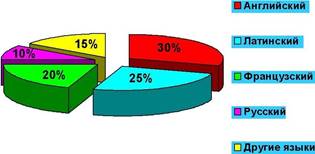
Appendix 2
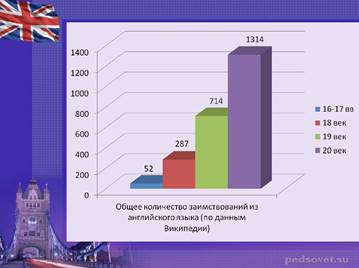
Appendix 3
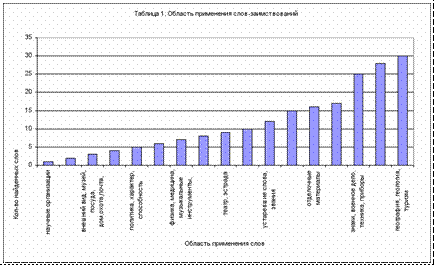
Appendix 4
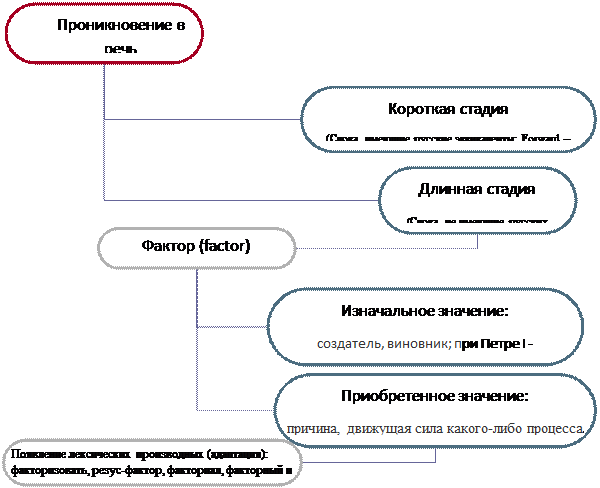
Appendix 5
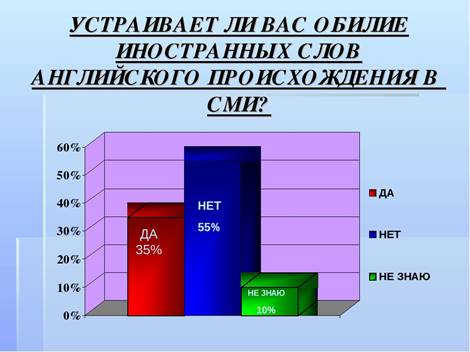
Appendix 6
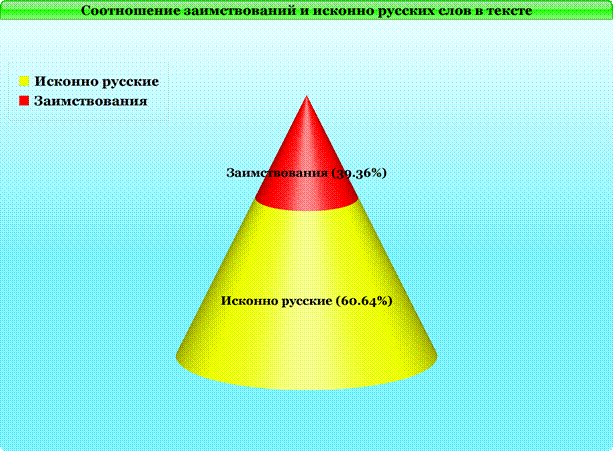
Appendix 7
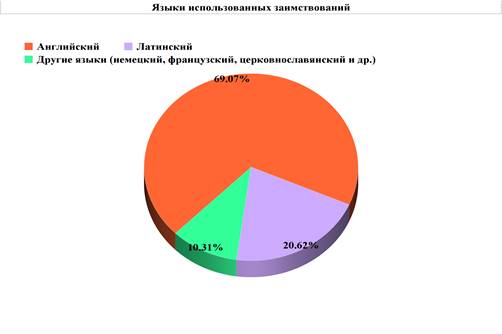
Appendix 8
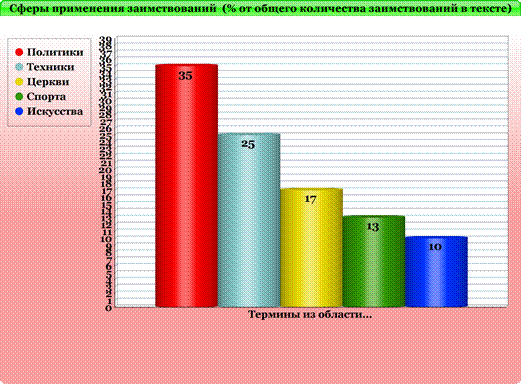
Appendix 9
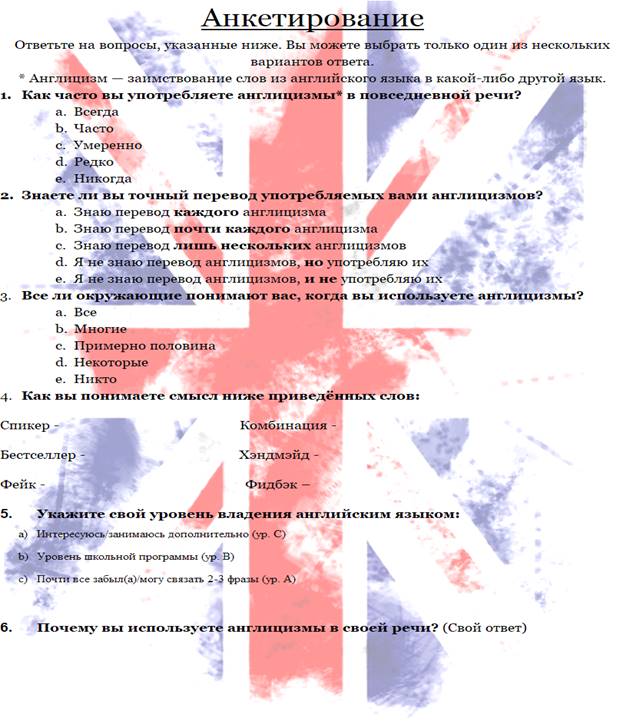
Appendix 10
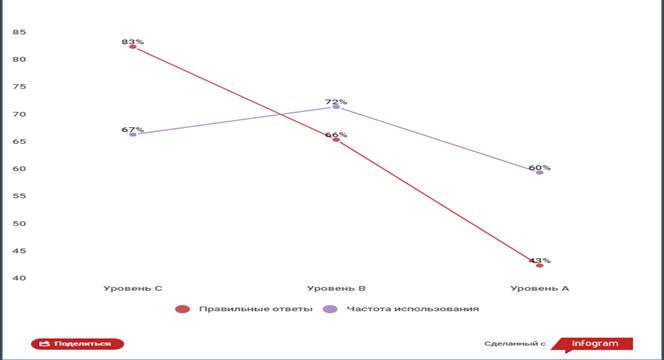
Appendix 11
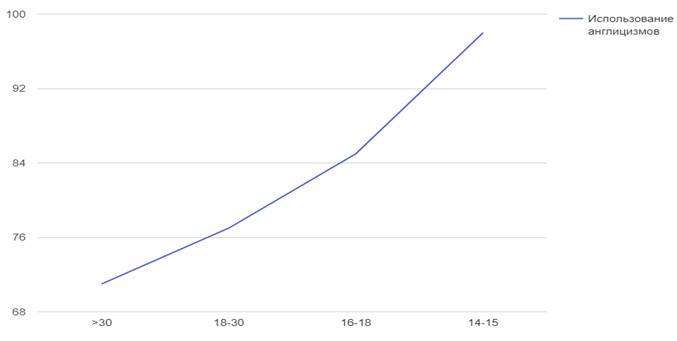
Appendix 12
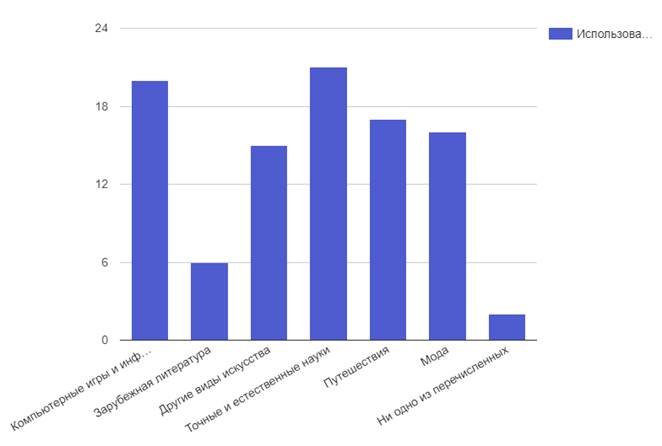
Appendix 13

Appendix 14
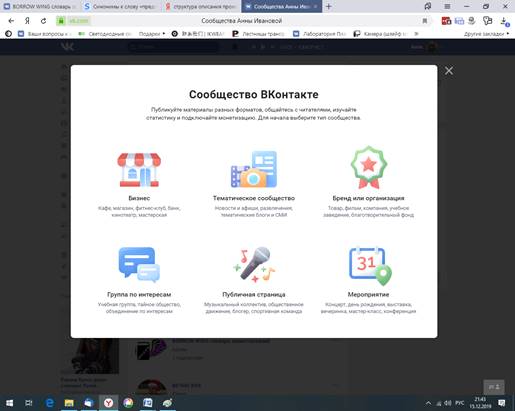
Appendix 15

Appendix 16

Appendix 17

Appendix 18
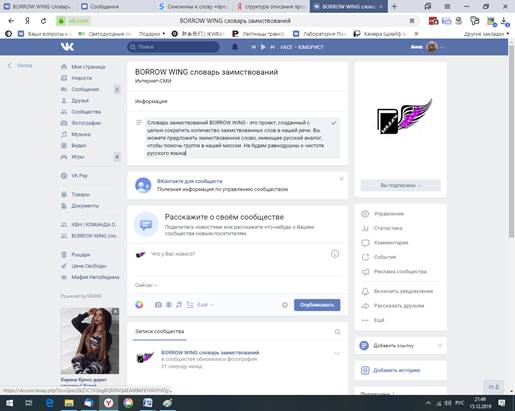
Appendix 19

Appendix 20

Скачано с www.znanio.ru
Материалы на данной страницы взяты из открытых источников либо размещены пользователем в соответствии с договором-офертой сайта. Вы можете сообщить о нарушении.